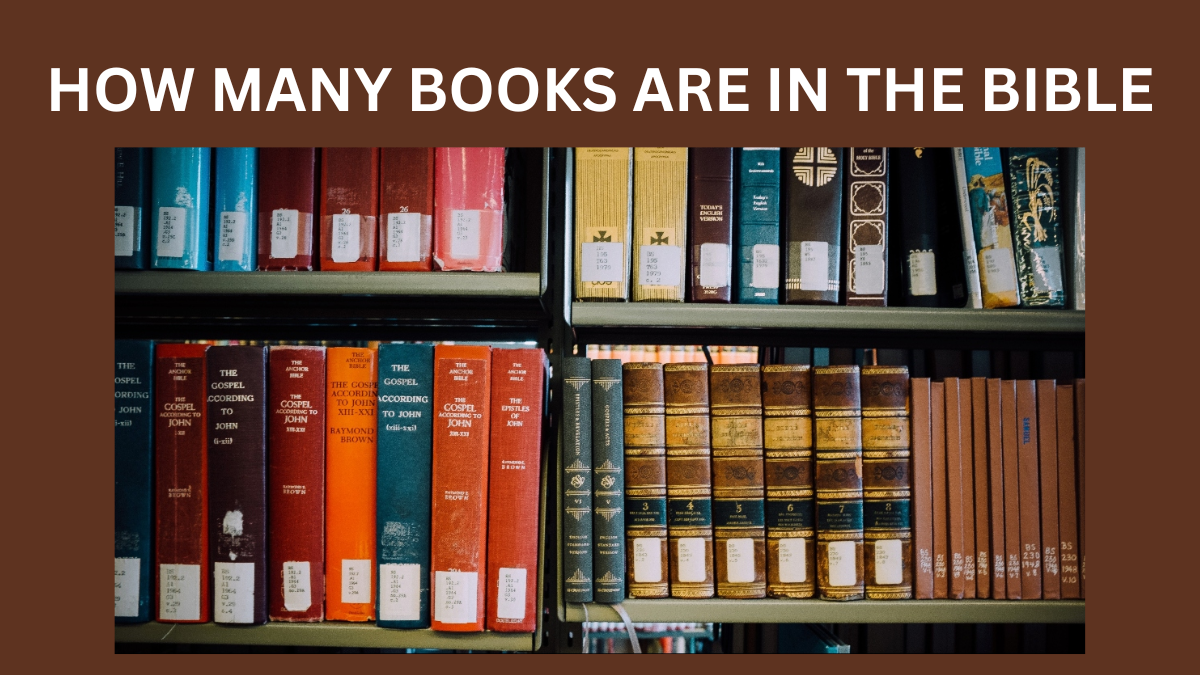The book of Genesis is the first book of the Pentateuch, also known as the Torah, and is considered the foundation of the Hebrew Bible. It is a book of origins, telling the story of the creation of the world, the first humans, and the early history of humanity. The book is divided into two main sections: the primeval history (chapters 1-11) and the patriarchal history (chapters 12-50).
The book of Genesis sets the stage for the rest of the Pentateuch, introducing key themes such as God’s relationship with humanity, the concept of covenant, and the promise of salvation.
This article will tell you everything related to how many books are in the Bible:
Contents
- Exodus
- Leviticus
- Numbers
- Deuteronomy
- How many books are in the bible related to Israel’s History Post-Egypt to the Babylonian Exile
- Joshua
- Judges
- Ruth
- 1 Samuel
- 2 Samuel
- 1 Kings
- 2 Kings
- 1 Chronicles
- 2 Chronicles
- Ezra
- Nehemiah
- Esther
- Summaries for the Wisdom and Poetry Books
- Psalms
- Proverbs
- Ecclesiastes
- Song of Solomon
- FAQs
- How many books are in the Bible
- Why are there different numbers of books in different Bibles?
- Read More:
Exodus
The Book of Exodus is the second book of the Pentateuch and continues the story of the Israelites, who are now in slavery in Egypt. The book tells the story of God’s deliverance of the Israelites from slavery and their journey to the Promised Land. The book is divided into two main sections: the Book of the Covenant (chapters 1-24) and the Book of the Wilderness (chapters 25-40).
Leviticus
The Book of Leviticus is the third book of the Pentateuch and is often considered the most ritualistic and technical. It is a book of laws and regulations, detailing the rituals and sacrifices that the Israelites were to perform to maintain their relationship with God.
It also highlights the importance of the priesthood and the role of the Levites in mediating between God and the people.
Numbers
The book of Numbers is the fourth book of the Pentateuch and continues the story of the Israelites’ journey through the wilderness. The book is divided into two main sections: the book of the census (chapters 1-10) and the book of the wilderness wanderings (chapters 11-36).
The book of the census recounts the Israelites’ census and the organization of the tribes, while the book of the wilderness wanderings tells the story of the Israelites’ rebellion against God and their eventual arrival at the border of the Promised Land. The book of Numbers highlights the importance of faith and trust in God, as well as the consequences of disobedience and rebellion.
Deuteronomy
The book of Deuteronomy is the fifth and final book of the Pentateuch and is often considered a summary of the entire Pentateuch. The book is a collection of sermons and speeches given by Moses to the Israelites just before they entered the Promised Land.
The book is divided into three main sections: the review of the law (chapters 1-4), the review of the wilderness wanderings (chapters 5-28), and the review of the covenant (chapters 29-34).
This period spans approximately 1,000 years, from around 1200 BCE to 586 BCE. The books provide a comprehensive account of the Israelites’ journey, highlighting their triumphs, struggles, and failures.
Joshua
The book of Joshua tells the story of the Israelites’ conquest of Canaan, the Promised Land, under Joshua’s leadership. After the death of Moses, Joshua succeeded him as the leader of the Israelites and led them across the Jordan River into Canaan.
Judges
The Book of Judges recounts the period between Joshua’s death and the rise of the monarchy in Israel. During this period, the Israelites were ruled by a series of judges who led them in times of war and peace.
Ruth
The Book of Ruth is a narrative that takes place during the period of the judges. It tells the story of Ruth, a Moabite woman who marries an Israelite and becomes part of the family of King David. The book explores themes of loyalty, love, and redemption and is often seen as a precursor to the story of King David.
1 Samuel
The book of 1 Samuel marks the transition from the period of the judges to the monarchy in Israel. It tells the story of the rise of King Saul, whom the people choose to succeed the judges, and the early years of his reign. The book also introduces the prophet Samuel, who plays a key role in the transition from the judges to the monarchy.
2 Samuel
The book of 2 Samuel continues the story of King David, who succeeds Saul as the king of Israel. The book describes David’s military conquests, his relationship with God, and his struggles with his own sin and the consequences of his actions. It also introduces the story of Absalom, David’s son, who rebels against him.
1 Kings
The Book of 1 Kings begins the story of the divided monarchy in Israel, with the kingdom split into two parts: the Kingdom of Israel in the north and the Kingdom of Judah in the south. The book describes the reign of King Solomon, who built the Temple in Jerusalem and established a strong and prosperous kingdom. However, the book also highlights the divisions and conflicts that arise within the kingdom.
2 Kings
The book of 2 Kings continues the story of the divided monarchy, describing the reigns of the kings of Israel and Judah. The book highlights the decline and fall of the northern kingdom of Israel, which the Assyrians conquer, and the subsequent rise of the kingdom of Judah under King Josiah.
1 Chronicles
The book of 1 Chronicles provides a genealogical and historical account of the Israelites from Adam to King David’s reign. It emphasizes the importance of the tribe of Judah and King David’s line and provides a detailed account of King David’s reign.
2 Chronicles
The book of 2 Chronicles continues the story of the kingdom of Judah, describing the reigns of King Solomon and his successors. The book highlights the importance of the Temple and God’s worship, as well as the divisions and conflicts within the kingdom.
Ezra
The book of Ezra tells the story of the return of the Jews from the Babylonian Exile and the rebuilding of the Temple in Jerusalem. The book describes the leadership of Ezra, a priest and scribe, who plays a key role in the rebuilding process.
Nehemiah
The book of Nehemiah tells the story of the rebuilding of the walls of Jerusalem and the restoration of the city. The book describes the leadership of Nehemiah, a governor of Judah, who plays a key role in the rebuilding process.
Esther
The book of Esther tells the story of a Jewish woman named Esther, who becomes queen of Persia and saves the Jewish people from persecution. The book highlights the importance of faith and courage in the face of adversity.
Summaries for the Wisdom and Poetry Books
The book of Job is a poetic book that explores the theme of suffering and the nature of God. The story revolves around Job, a righteous and blameless man who is afflicted with various trials and tribulations.
Job’s friends, Eliphaz, Bildad, and Zophar, attempt to offer explanations for his suffering, but Job’s responses reveal his deep emotional pain and his desire to understand the purpose of his suffering. The book ultimately concludes with Job’s restoration and a deeper understanding of God’s sovereignty.
Psalms
The book of Psalms is a collection of 150 poems that express a wide range of emotions and experiences. The psalms are attributed to various authors, including King David, who wrote many of the psalms. The book is divided into five sections, each with its own unique themes and styles. The psalms cover topics such as worship, praise, lament, thanksgiving, and wisdom.
Proverbs
The book of Proverbs is a collection of wise sayings and teachings that guide how to live a virtuous and successful life. The book is attributed to King Solomon, who is said to have written many of the proverbs. The book is divided into two main sections: the first 9 chapters are attributed to Solomon, while the remaining 22 chapters are attributed to other wise men.
Ecclesiastes
The book of Ecclesiastes is a poetic book that explores the meaning of life and the nature of human existence. The author, who is often identified as King Solomon, reflects on the fleeting nature of life and the futility of seeking happiness and fulfilment in material possessions and worldly pursuits.
The book concludes that true wisdom and happiness come from fearing God and living by His will.
Song of Solomon
The book of Song of Solomon is a poetic book that celebrates the beauty and joy of romantic love. The book is a series of poems that describe the love between two individuals, often interpreted as King Solomon and his beloved.
FAQs
How many books are in the Bible
The Bible consists of 66 books, 39 of which are in the Old Testament and 27 of which are in the New Testament.
Why are there different numbers of books in different Bibles?
The Protestant Bible, Roman Catholic Bible, and the Hebrew Bible have some differences in the number of books. The Protestant Bible has 66 books, while the Roman Catholic Bible has 73 books, and the Hebrew Bible has 24 books in the Old Testament.
Read More:
- The Real Reason Invoices Go Unpaid — And How Collection Automation Can Fix It
- Best Places to Buy Diamonds and Engagement Rings Online
- Building Focus and Strategy Through Interactive Digital Experiences
- How Students’ Reading Interests Influence Their Motivation and Performance in Writing Assignments
- The Damages Resulting from the Use of Suboxone

Chandler is an avid automobile enthusiast who is passionate about all things on wheels. From the latest car models to classic vintage rides, I love exploring the automotive world’s intricate details and engineering marvels. With years of experience in test-driving, reviewing, and analyzing cars, I provide readers with comprehensive insights and honest opinions.



























